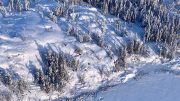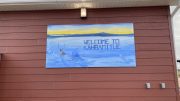The Sahtú Renewable Resources Board (SRRB) is holding a hearing or “Public Listening Session” in Colville Lake on Tuesday and Wednesday of this week to look at the most effective way to approach caribou harvesting and address conservation pressures on the caribou herds in the region.
According to a news release, the Colville 2020 Public Listening Session is a hearing process set up in a way to encourage maximum participation from Sahtú Dene and Métis as well as government.
“The SRRB will hear evidence from Sahtú communities and harvesters, as well as the NWT’s Department of Environment and Natural Resources,(ENR), on the topic of hunting laws and approaches to wildlife harvesting,” the release states.
The Session will address the central question, “What is the most effective way to regulate the harvest of caribou?”
Unlike previous caribou hearings that have focused on individual populations, this public listening session is to consider all three ecotypes of caribou that live in the Sahtú Region, including Bluenose West and Bluenose East barren-ground caribou, boreal caribou, and mountain caribou.
The board has received evidence of conservation concerns related to all three kinds of caribou.
The hearing will highlight the host community Colville Lake’s proposed caribou conservation plan.
The Colville Lake plan proposes a community-led approach to caribou stewardship in their homeland.
The plan also includes proposals for community oversight of caribou harvesting, direct participation in collecting and assessing caribou information, community monitoring of the local harvest, and extensive community education efforts about caribou conservation matters.
Other Sahtú communities as well as Elders (sponsored by Sahtú Dene Council) and the Sahtú Youth Network will also present evidence related to harvest regulation at the hearing.
The hearing will also explore how the Sahtú community-led conservation planning approach fits within the broader territorial framework (including cross-regional conservation plans that are already in place) for caribou conservation.
The SRRB has also encouraged participation from concerned neighbouring regions, and a number of communities and regions will be either observing or participating as parties.
In particular, the Wildlife Management Advisory Council (NWT), Inuvialuit Game Council, Ross River Dena Council have contributed submissions.
Kugluktuk Angoniatit Association, Dehcho First Nations and Acho Dene Koe First Nation have also been confirmed as parties.
The designation “Public Listening” emphasizes the SRRB’s intention to ensure that the hearing proceeding is as fair as possible in a cross-cultural context. Several innovative methods will be introduced for the first time to support cross-cultural understanding, including pauses for discussion of terms and concepts, and live graphic recording of presentations by Drawing For Change artist Sam Bradd.
This hearing follows the 2016 Sahtú hearing on the Bluenose East which considered a community-led caribou conservation plan for the first time.
In 2016, the community of Délın̨ę presented the Caribou For All Time Plan which included local involvement in monitoring harvesting, educating community members on conservation issues, applying traditional Dene laws related to respect for caribou, supporting the harvest of alternative species and a number of other initiatives.
The SRRB decided to examine issues related to caribou conservation needs on a topic-by-topic basis rather than the herd-by-herd basis usually used for hearings on caribou conservation.
It says this will allow more detailed consideration of specific “hot topics” in caribou conservation and addresses a concern raised by Sahtú Dene and Métis that better processes for examining the issues affecting caribou are needed in the face of current extreme conservation pressures on the herds.
The Colville 2020 Public Listening Session is online at www.srrb.nt.ca.
John has been in the broadcast journalism industry since the 1980s. He has been a reporter in Yellowknife since 2012 and joined CKLB in January of 2018.
John covers the crime and court beat as well as reporting on other areas including politics, business, entertainment and sports.
He won seven national community newspaper awards while he was a journalist with Northern News Services Limited (NNSL).
John worked in Ontario before coming North including stints as a TV sportscaster in Peterborough and senior news writer for CBC and CTV in downtown Toronto.









